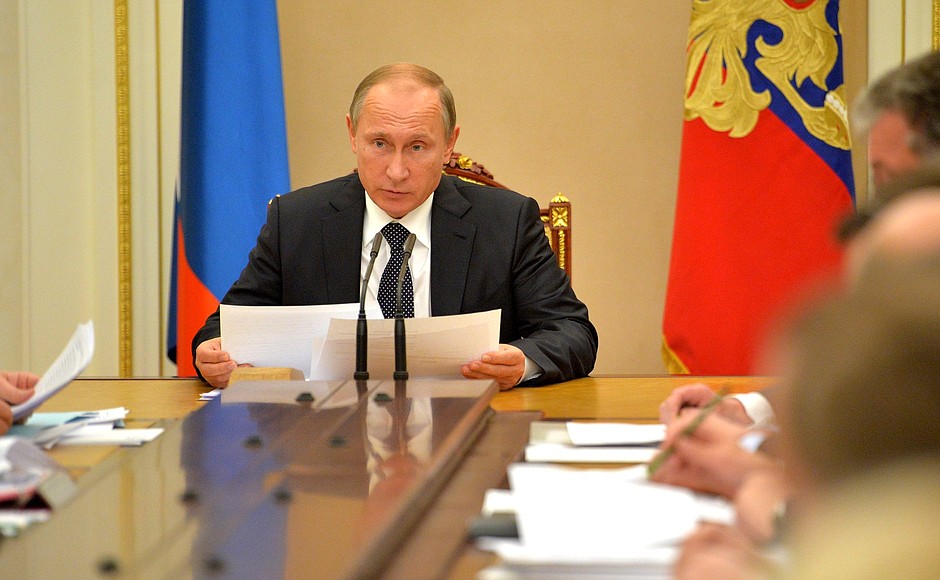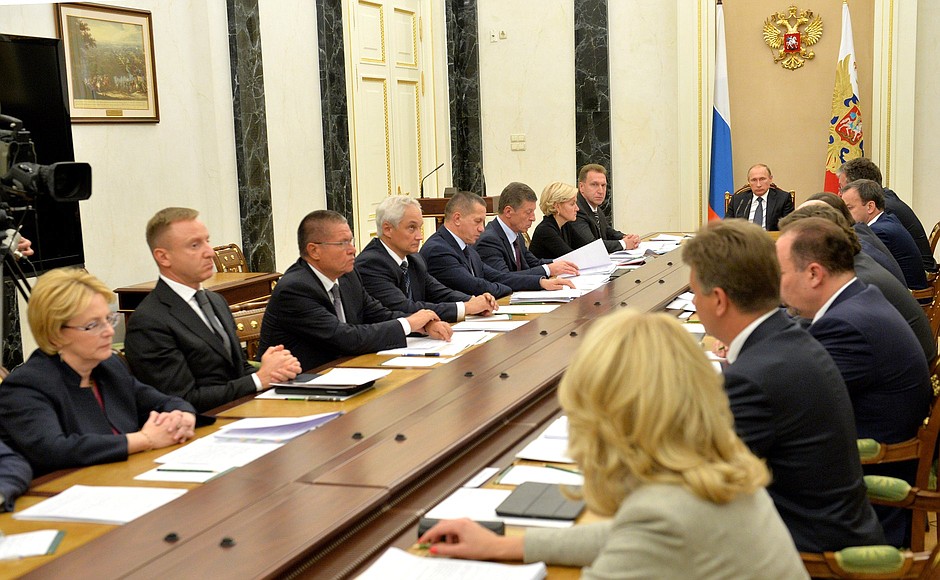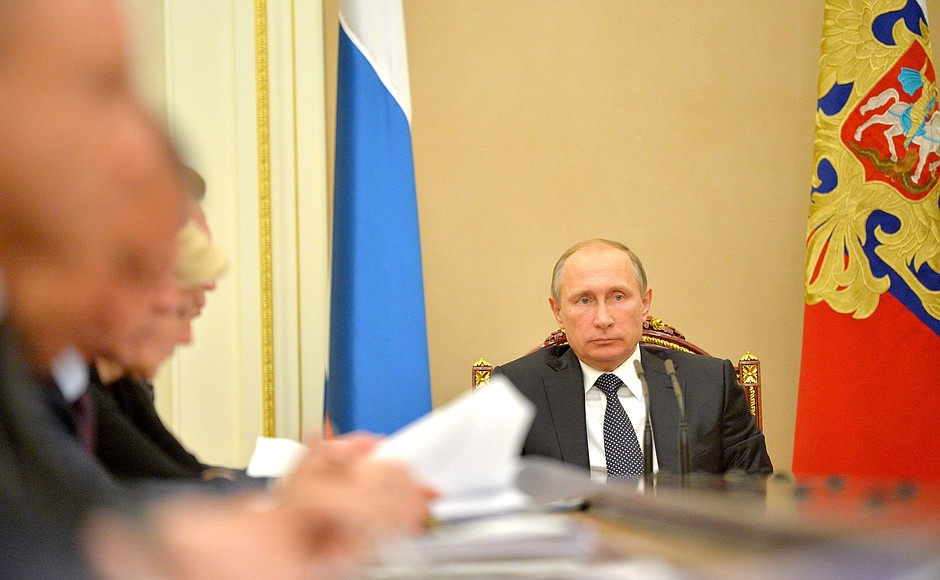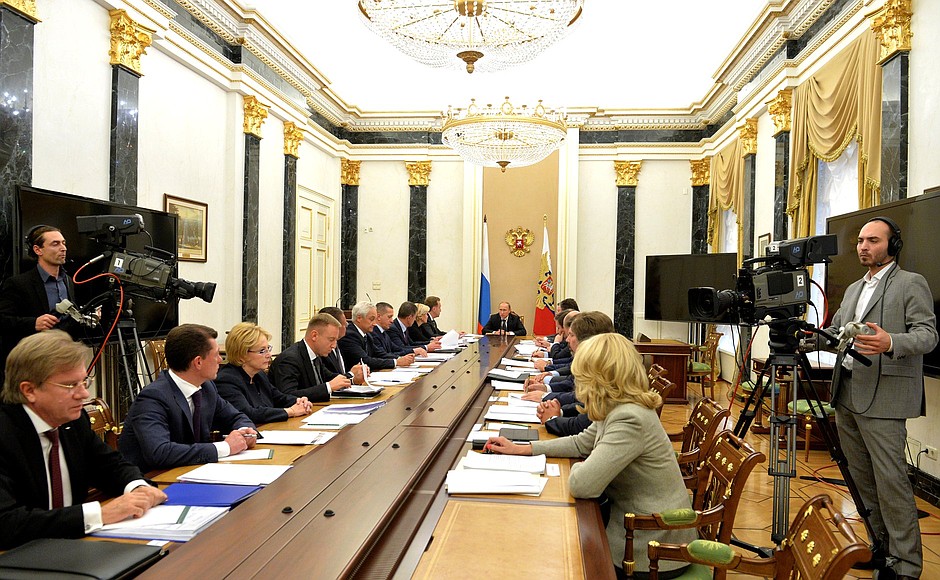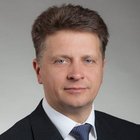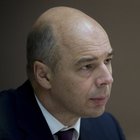Excerpts from transcript of meeting with Government members
President of Russia Vladimir Putin: Good afternoon, colleagues.
Today we will consider some matters dealing with economic cooperation on the world arena; we will discuss the implementation of the Address [by the President to the Federal Assembly] of December 5, 2014, and traditionally – a number of current matters. First, let us consider the situation with air transportation.
Together with some colleagues, we have just returned from the VTB bank forum, and there were questions regarding Transaero there. I know the company has been battling financial problems for more than a year now. This has to do not only with the crisis in the economy, though it had its impact, of course, on the situation around Transaero, but mainly with the very essence of the company’s economic policy, its financial policy.
We will not go too deep into this now, but I would like to say that first all the commitments to passengers must be fulfilled. The majority of the passengers have already been transported, but over 200,000 remain. This is the first point.
The other is that everything possible should be done to resolve social issues dealing with the employment of the staff: pilots, navigators, cabin crew and others working for Transaero – this is over 10,000 people.
And finally, we need to consider how we can support the companies that have stepped up and are transporting the passengers. Also, the sale of tickets must be stopped, of course. They are not sold directly anymore, but travel agents still include Transaero flights in their package tours and continue selling them. If anyone continues doing this, they should all bear in mind that the risk is theirs alone.
Mr Sokolov, please, go ahead.
Transport Minister Maxim Sokolov: Mr President,
I want to start by noting that currently, aviation operations carried out by Transaero and conveyance of air passengers holding Transaero tickets are carried out by Transaero itself, as well as by Aeroflot, which took on operational management of the company in early September. Other air carriers in the industry are also lending a hand, including Siberia Airlines, Ural Airlines, UTair and Taimyr Air.
To date, since taking on operational management in early September, Aeroflot has transported 1.7 million passengers. We still have 240,000 passengers to be transported by the end of the year, by December 15 to be exact, the date after which all tickets will be cancelled, but the money paid for them will be fully refunded. These passengers include tourists who bought their tickets as part of the tourist package. The industry will certainly handle this challenge, since the majority of passengers have already been transported. Of course, there were some inconveniences, but overall, we didn’t have any particular problems.
As for tourist destinations, we have reached an agreement on three of them – Hurghada, Sharm el-Sheikh and Punta Cana in the Dominican Republic – with Biblio-Globus tour operator and Aeroflot on providing special aircraft, Boeing 777 airplanes that seat 360 people, and tour companies will be able to carry their passengers on these destinations.
Since the sale of tickets was stopped on October 1 due to Transaero’s unsatisfactory financial situation, if anyone buys tickets for all other destinations, as you very rightly stated, the risks will be borne by tour operators, tour companies and people who buy or may buy such tickets.
As for Transaero personnel, that’s about 11,000 people, Transaero’s training centre is already operating a special Moscow and Moscow Region employment office, jointly with federal executive agencies, the Federal Labour and Employment Service, and the Federal Air Transport Agency. And we can see that overall, more than 6,000 people can move to Aeroflot and continue their careers there. In the event of bankruptcy, many of the company’s employed workers can move to Sberbank, and Sberbank has already said that it is ready to accept Transaero personnel.
We are also working with the airports of the Moscow aviation hub: more than 600 jobs are currently open, including at the new Ramenskoye Airport, which will open at the beginning of next year. So in any case, questions pertaining to employment of Transaero personnel are generally under control and will be resolved with minimum costs.
Otherwise, all operations currently on Transaero’s schedule are carried out by Aeroflot and the carriers I mentioned. And there is no doubt that all passengers holding Transaero tickets will be transported by December 15.
General Director of Aeroflot Vitaly Savelyev: I want to add that this is the first time we are seeing such a major reorganisation in Russia, such a major conveyance of passengers. In 2008, KrasAir went bankrupt, failing loudly and massively, and back then, we had to transport 500,000 people. Now, we have already transported 1.7 million out of 1.95 million passengers. Aeroflot knows its job, we are taking on significant financial expenditures, but we treat this matter with understanding.
Vladimir Putin: I assume the Transport Ministry will support your company, in the sense that Aeroflot ultimately works in the market, and it is unfavourable to take on this extra burden. So they will need to receive certain benefits or support from the Government of the Russian Federation for what they are doing.
Maxim Sokolov: Ok.
<…>
Vladimir Putin: Mr Siluanov visited Peru, where he participated in the latest IMF session. Please tell us about the discussion and the questions on the agenda – what were the main problems addressed, and what was the tone?
Finance Minister Anton Siluanov: Mr President, we had a meeting of the G20 finance ministers; we discussed the general situation in the global economy. It was noted that the global economy’s growth rates and forecasts are slowing down. We discussed that there is a slowdown in nations with developing economies; the rates in the United States of America remain okay, but nevertheless, everyone was concerned about the future trends. The agenda for China’s G20 presidency next year was announced, which will particularly focus on economic growth and sources of investment; in other words, it will also largely continue the trend that started the year that Russia chaired the G20.
I would like to say that on the G20 sidelines, I had several meetings with IMF leadership, colleagues from the People’s Republic of China, and Ukraine’s Finance Minister.
I want to say just a few words about meeting with my Ukrainian colleague. I explained our position that Ukraine’s debt to Russia is official and cannot be viewed as a trade debt, which is being currently negotiated with Ukraine’s leadership. It has been indicated that this is indeed a debt of one government to another, that it has been provided under non-market conditions, about two times lower than the cost of Ukraine’s debt at the moment when this money was provided. I have stated that under current conditions, we have taken these resources into account in our budget process, during the formation of our budget for next and subsequent years.
So here is what we can do on our part: we will appeal to arbitration courts in accordance with Ukraine’s bond issue terms and conditions based on international law (these bonds were issued based on English law); we will also question the viability of the programme before the International Monetary Fund, since our previous experience shows that the fund’s programmes should provide for repayment of obligations to financial creditors on a mandatory basis. In this case, Russia is an official lender.
I spoke with colleagues from the Monetary Fund about how they are preparing changes to law enforcement, motivated by the fact that common changes in approach are being prepared in order not to include all obligations to sovereign nations, to official creditors, in the volume of the programme, meaning in the volume of financial support from the IMF. Clearly, this is done in this case exclusively in order to freeze payments to the Russian Federation.
Mr President, we are currently preparing a specific plan of action in the event that Ukraine suffers a default, and in essence, if Ukraine does not pay by the end of December, then this can be described as a default, a non-payment by one government to another, despite the effect of IMF programmes. So we will prepare this action plan and present it to you for consideration.
Vladimir Putin: Very well.
I am not very clear on the logic of our partners’ actions, because they are well aware that first of all, Russia participates in lending to Ukraine through the IMF. After all, as far as I understand, our input into the IMF’s efforts continues; we have not stopped helping Ukraine through the IMF, have we?
Anton Siluanov: Mr President, indeed, we participated in the first tranche of IMF assistance to Ukraine. In addition to this, we are talking about the fact that we have just decided on the prices for gas supplies to Ukraine; special decisions were made. Moreover, our banks, which have subsidiaries in Ukraine, capitalise these banks. We have already made one billion dollars’ worth of payments and transfers like this, and we plan about a billion dollars more. So we are essentially continuing to provide assistance to our neighbour, and this is also part of the programme adopted by the International Monetary Fund for providing financial assistance to Ukraine.
Vladimir Putin: And furthermore, as you recall, we have long had the right to demand repayments of this debt ahead of December, meaning that conditions are in place in accordance with our contract on providing what is essentially a loan. But we did not do this precisely in order to avoid putting our Ukrainian partners in a difficult position and exacerbate an already difficult economic situation. But they need to return our money. And why doesn’t the IMF want to add those three billion to Ukraine so that it can pay us back? Why change its rules for a specific nation, essentially destroying the very system of rules for how the IMF functions? You will talk with your colleagues there. And I think it is easier to follow the path of adding three billion dollars for Ukraine, so it can pay us back, and everyone will be happy and work calmly. Because if the rules are changed in favour of one of the nations, this may be followed by demands to change these rules for other nations as well, and what will that lead to?
We need to once again discuss all of these questions in a calm, working atmosphere and find solutions to avoid being outweighed by all the problems we just discussed at the forum. As regards Syria, they say we are overshooting targets there. On Sunday, American planes bombed an electrical power plant and transformer in Aleppo. Why did they do this, who were they punishing there? What was the point? Nobody knows. But all this will become clear and there will be fewer mistakes if we maintain direct, working contact based on a desire to resolve all the problems, including financial ones. I ask you to continue that dialogue with our partners in Kiev and colleagues from the IMF.
Let’s discuss our current work.
<…>
